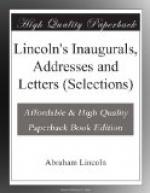Perhaps the most striking characteristic of Lincoln’s personality apart from his honesty and sincerity was his perfect simplicity and naturalness. Frederick A. Douglass, the great leader of the colored race, once remarked that President Lincoln was the only white man that he had ever met who never suggested by his manner a sense of superiority. Not that Lincoln was lacking in personal dignity. Neither as a practising lawyer nor as President of the United States, would he permit anyone to take what he regarded as liberties with him. But, on the other hand, he did not allow his elevated position to change his personal relations. His old Illinois friends found in the White House the same cordial welcome and simple manners to which they had been accustomed in the pleasant home at Springfield.
During the first few weeks of the administration it was believed by many persons, including Mr. Seward himself, that President Lincoln would be greatly influenced in his policy by the superior experience in public affairs of his Secretary of State. Mr. Seward even went so far as to draw up a plan of action, which he submitted to his chief. Lincoln soon showed, however, that he was not a follower, but a leader of men, beneath whose good nature and kindly spirit was a power of initiative that has rarely been equalled among the statesmen of the world. Even the dictatorial Secretary of War found it necessary to yield to the President on all points that the latter regarded as being fundamental. Few other presidents have been so bitterly attacked and so cruelly misrepresented as Lincoln, but nothing could turn him from his purpose when that was once formed. Like the wise man that he was, Lincoln was always ready to listen to the suggestions of others, but the conclusion finally reached by him was always his own. He applied to questions of state the same methods of careful, impartial inquiry that had served him so well as a lawyer on the Illinois circuit, and if, being human, he did not always avoid committing errors, he never acted from impulse or prejudice. Lincoln was a strong leader, but he was at the same time a wise leader.
Turning now from the man to his works, we note first that the development of Lincoln’s style was slow. One might almost be tempted to say that Lincoln developed several different styles in succession. This, however, is hardly true, for in spite of the numerous marked changes and improvements in Lincoln’s manner of writing, certain fundamental qualities remained, the real expression of his personality, that is, the real style of Lincoln. From the beginning to the end we find an effort to say something and to say it in as clear a manner as possible, an effort without which there can be no real success in writing. After a practice in public speaking of over thirty years Lincoln as President could still say: “I believe I shall never be old enough to speak without embarrassment when I have nothing to talk about.”




